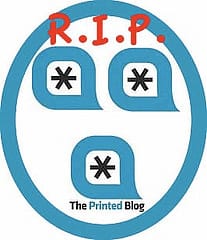The Printed Blog: Dumb Idea Finally Drops Dead
As reported yesterday with far too much column space on Crain's Small Business Blog, the paper formerly known as The Printed Blog has ceased publication after a short, six-month lifespan. If you're scratching your head right now wondering what paper I'm talking about, that's entirely my point.

This content originally appeared on my former Chicagosphere online-media blog, hosted on the Chicago Tribune's ChicagoNow network.
As reported yesterday with far too much column space on Crain's Small Business Blog, the paper formerly known as The Printed Blog has ceased publication after a short, six-month lifespan. If you're scratching your head right now wondering what paper I'm talking about, that's entirely my point.
The goal for Printed Blog founder Joshua Karp was to create a print publication out of republished Windy City blog posts, distribute that paper for free in specific neighborhoods, and support the venture with local ads from neighborhood businesses. The paper only managed 16 issues and 80,000 distributed copies in the six months before it failed.
I'm surprised it lasted that long.
On Tuesday, Crain's interviewed Karp at length regarding why the paper was unable to find enough of a funding base of interested investors to keep it going. Incredibly, Karp blamed the Internet for sabotaging his, ahem, Internet-based business venture. This Karp quote from Crain's:
"I argued, again and again, that it was much easier to get local ads when you had a physical product, and you could charge a ton more, but everyone keeps funding local online news aggregation sites that will just turn out to be hobbies, unless they can start charging for something."
Well turn me over and paint me blue, you mean to tell me those popular, topical, easily outdated blog thingies that seem to work so well on the Internet weren't a big hit when taken offline? Who would have thunk it?
Apparently not Crain's. Yesterday's post noted:
The idea caught the media's imagination -- partly because Mr. Karp had such a novel, innovative approach, and also because we're obsessed with finding viable business models for our foundering industry.
Novel I'll give Crain's. Karp had an unprecedented idea, for sure. That's probably why desperate-for-a-life-preserver print media lauded him for it. (See this comment in yesterday's Windy Citizen coverage of Printed Blog's closure to learn just how highly.) Unfortunately, novelty does not automatically equal sustainability.
But innovative? Not by a longshot. Regressive is more like it. Short-sighted if you want to be blunt.
In the case of the blogosphere, it couldn't be more obvious that the medium is the message. The Internet's fundament of immediate communication gave birth to blogging, which relies heavily on that foundation for the unique elements that make blogs blogs: instantly available references to other sources (links); real-time feedback and community engagement (comment threads); and the ever-ready availability of timely content.
None of those basic elements of blogging are available in print. Why Karp would be surprised that advertisers and funders would want to stick with what works when it comes to blogs is puzzling.
Why any blogger would agree to give Printed Blog their content is also hard to figure out. Printed Blog sought to profit from the work of online bloggers, but offered no compensation beyond "seeing your name in print." (That's a 21st Century selling point?)
Perhaps Printed Blog misconstrued the benefit that bloggers who offer their content for free on sites like Huffington Post Chicago are actually receiving. It's not "seeing their name online," I assure you. It's getting a juicy, community-building, platform-strengthening traffic boost back to your own webpage that an association with a nationally prominent blogging network with a large, link-friendly viewership can provide. No one can link back to you or leave a post in your comment thread when your post is in a printed newspaper.
Totally unfathomable is why anyone would even have attempted a venture like Printed Blog in the first place during the continuing, juggernaut blossoming of the worldwide smart-phone market. Half the planet and their grandmother already own an iPhone, Blackberry, or lowly generic yet still extraordinarily web-enabled mobile device, allowing them to gobble steaming fresh helpings of blog goodness in real-time while they wait for the bus.
So why would anyone expect them to be eager to consume cold, stale, days-old blog posts in a format far less appetizing than the one they have immediately accessible in their pants pocket or purse?
Sadly, this isn't a rhetorical question.




